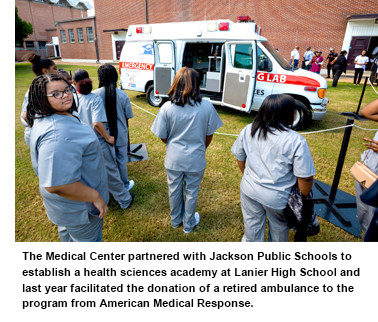No Quality Without Equality
Note: I’m out of the office this week, so today I’m recycling a VC Notes first published Nov. 13, 2015. As you will read, it references two topics that have been very much in the news recently – the travails of the city of Baltimore and our society’s continuing struggle with racial division. William Faulkner’s famous line still resonates: “The past is never dead. It isn’t even past.” And that’s why we must all be committed to overcoming it.
Good morning!
Earlier this week I had the pleasure of going to the annual meeting of the Association of American Medical Colleges. I enjoy attending these meetings to learn the latest trends affecting medical schools, teaching hospitals and research institutions, and to share ideas with leaders of other academic medical centers.
This year's meeting was in Baltimore, Maryland. It's a lovely and historic city that was sadly torn apart by riots last spring after the death of a young black man while in police custody. Similar incidents played out in other cities around the country during the last year.
 So it was not a coincidence that a theme running through several of the leadership speeches this year was the role AMCs have in promoting health equity and social justice for all of our citizens. Indeed, provision of care that is equitable to all citizens is one of the six areas cited for needed improvement in the Institute of Medicine's 2001 landmark report, “Crossing the Quality Chasm.”
So it was not a coincidence that a theme running through several of the leadership speeches this year was the role AMCs have in promoting health equity and social justice for all of our citizens. Indeed, provision of care that is equitable to all citizens is one of the six areas cited for needed improvement in the Institute of Medicine's 2001 landmark report, “Crossing the Quality Chasm.”
Dr. Darrell Kirch, president of the AAMC, noted that “You can't have true quality without equality.” And Dr. Peter Slavin, CEO of Massachusetts General Hospital and chairman of the AAMC Board of Directors, took a strong stand when he said, “Issues of equity and justice are not separate from the practice of medicine; they are central to the practice of medicine.”
Dr. Slavin also noted that the strongest predictor of health status is race. “We can't rest until every patient, every employee, every student feels that our institution is an open, inclusive and welcoming community,” he said.
During these inspiring talks, I thought about our own progress toward these important goals. As we all know, our state historically has fallen short in the equitable treatment of its citizens. And we have large health disparities based on race, geographic location, socioeconomic status and other factors.
And while I'm not so naive to think that we have adequately addressed these problems - far from it - I do think we are advantaged in some ways because we have long recognized these areas of needed improvement and have been working on them for many years.
You don't have to look far to notice all the activities that members of our UMMC community are involved in to promote health equity:
- The recent establishment of a school-based clinic for adolescent health at Lanier High School, an initiative of our School of Nursing
- The continued growth and success of our student-run Jackson Free Clinic
- The establishment last summer of a clinic serving the LGBT community by our Department of Psychiatry and Behavioral Health
- Our nationally recognized HIV clinic operated out of the Department of Medicine in concert with the state Department of Health
- Our leadership of a statewide collaborative project that is making gains in addressing infant mortality
- Our Midtown UNACARE Clinic operated by the School of Nursing as well as school-based clinics in Jackson and the Mississippi Delta
- Our many programs at all grade levels that introduce minority students to health careers, including most recently the Healthcare Equity and Leadership Institute out of the School of Health Related Professions
- Our continued commitment to the Jackson Medical Mall Thad Cochran Center, now in its 20th year
- The growing influence of the Myrlie Evers-Williams Institute for the Elimination of Health Disparities
- The Jackson Heart Study - our partnership with Jackson State University and Tougaloo College on the investigation of cardiovascular risk factors in African Americans
- Note: Since this column was written, we’ve created the Office of Diversity and Inclusion, which is measuring our progress and leading us to do more.
I could go on, but I think you get the picture that health equity and justice is central to our mission and, indeed, to our identity.
Is it time to rest on our laurels? In some ways, we've barely scratched the surface of these issues. We still have huge health disparities in our state. Our workforce is not as diverse as it needs to be. We want our student body to better reflect the racial and ethnic makeup of our state's population. And no matter how enlightened and progressive we may be, we are all subject to “unconscious bias” toward those we perceive as different from ourselves.
But for the most part, our hearts and minds are in the right place. And we are working toward our goals across the board, most notably in our education and training of new generations of highly ethical, culturally competent health care professionals and in our equitable treatment of every patient who needs us, every day.
Our commitment to health equity and justice is an indispensable part of what it will take to reach A Healthier Mississippi.



